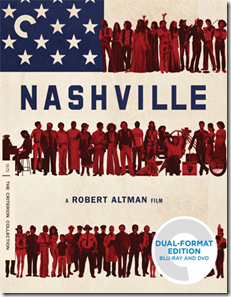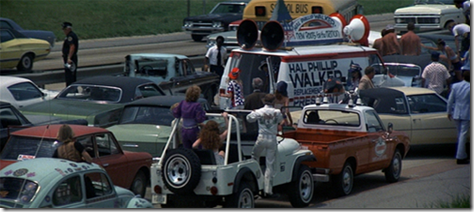For an all-too-brief time in the 1970s, the Hollywood studios financed and released serious art. They greenlit films without likeable heroes, clearly-defined villains, or conventional, three-act plots.
They even financed Robert Altman, who did his best work during that time. And Nashville was unquestionably one of his best. It’s tragic, funny, thoughtful, and filled with interesting and entertaining characters. It’s a realistic slice of life, an over-the-top melodrama, and an absurdist comedy. As is appropriate considering the titular city, the film is filled with great music. And amazingly, it all works.
In lieu of a conventional plot, Nashville follows a lot of different people, all with some overlapping connection to each other, as they go about their business in country music’s home town. In the course of the film’s long running time (160 minutes), Altman and screenwriter Joan Tewkesbury introduce us to famous singers, obscure singers, one horrible singer, businessmen, and a politician whom we never actually see, but whose voice we hear constantly over loudspeakers.
And Altman–a director that every actor wanted to work with–put together one of the most impressive casts in movie history. And almost everyone got to play a fully-developed character and show their acting chops.
And their singing chops. Laugh-in veteran Henry Gibson and 70’s icon Karen Black play big music stars. Not only do they sing in the film–and sing very well–they wrote their own songs.
I can’t discuss everyone who stands out in Nashville, but here are some of my favorite characters:
Lily Tomlin plays a devoted wife and mother, a religious Christian, and the only white person in a Gospel choir. But she has something to hide, and that something–or perhaps I should say someone–comes back to town.
Like Gibson and Black, Ronee Blakley plays a big country western star. But she’s been away for a while; and she is very much not well. Her public loves her, but that love may slide as she mentally deteriorates.
Keith Carradine plays a singer/songwriter who enjoys being irresistible to women (and not much else). In one scene in a bar, Carradine sings the song "I’m Easy" (which he wrote), and four different women think he’s singing about them.
Geraldine Chaplin plays an astonishingly inept BBC reporter (if she really is a BBC reporter), with a knack for saying the wrong thing to the wrong person. Chaplin proves herself an excellent comedian, which is hardly surprising considering her father.
Also worth noting is Ned Beatty’s businessman, Shelley Duvall’s groupie, Keenan Wynn as a man with a sick wife, and both Barbara Harris and Gwen Welles as hopeful singers. Two actors who would become famous in the following decade, Scott Glenn and Jeff Goldblum, turn up in many scenes with little explanation..
Tewkesbury’s script finds many ways to bring all of the characters together. There’s a triumphant return at the Nashville Airport, the aftermath of a car accident, and several concerts. Many of the characters know each other and their lives overlap in various ways, but they all have their own separate stories.
Altman was not the first filmmaker to use this type of multithreaded narrative. To my knowledge, Agnès Varda did it first in La Pointe Courte (like Nashville, named after the place the story is set). Kurosawa did it in Dodes’ka-den. And even George Lucas did it in American Graffiti. But Altman did it so often that it became one of his trademarks. And his first time, in Nashville, he did it best.
First Impression
 The dead-tree parts of the package–the cardboard slip cover, the outside of the disc holder, and the small booklet–are treated to look like old, yellowed pulp paper. The booklet contains credits for the film and the transfer, and an article by Molly Haskell.
The dead-tree parts of the package–the cardboard slip cover, the outside of the disc holder, and the small booklet–are treated to look like old, yellowed pulp paper. The booklet contains credits for the film and the transfer, and an article by Molly Haskell.
Following Criterion’s current policy, the package offers the same content on DVD and Blu-ray. Because of all the extras, this requires three discs–two DVDs and one Blu-ray. Only a Blu-ray can hold both the movie and the extras–and have bookmarking features that DVD doesn’t support.
I do wish, however, that the package contained one other disc: the soundtrack album CD. This movie has some great songs.
How It Looks
Great. The Nashville Blu-ray has the look of the original movie–a 1970’s Hollywood film shot in anamorphic Panavision and Eastmancolor. The film doesn’t look razor sharp, but it was never intended to look that way. This was always–and I assume intentionally–a soft-focus movie. The colors are spot-on. The film grain is there if you look for it, but it’s not distracting.
How It Sounds
When I looked at the box, I was disappointed to read that it sports only a 5.1 surround soundtrack. Nashville was originally released in four-track magnetic stereo, and I was hoping that Criterion would recreate that original mix in 4.0 surround–as they did for High and Low.
But after watching the film and listening to the lossless MTS HD Master Audio 5.1 soundtrack, I can’t complain. It sounded great, and had that "Wow! This is in stereo!" effect that movies had before Dolby made the whole thing ubiquitous. I suspect it was very close to the original mix, with maybe a little bit of barely-noticeable split surrounds and subwoofer lows.
And the Extras
- Commentary track by Robert Altman: As I write this, I’ve only gone through about half of this. Altman has some interesting things to say, mostly about his seat-of-the-pants working methods, but he doesn’t seem to have enough to say, overall. He pauses a lot, often for long stretches.
- The Making of Nashville: This new, high-def documentary by Criterion runs for 71 minutes. Cast members and other collaborators talk about Altman and the movie. Easily the best extra on the disc.
- Robert Altman Interviews: Three different TV interviews, from 1975, 2000, and 2002. About 40 minutes total. Although there’s some repetition, all three are worth watching.
- Behind the Scenes: 12 minutes. Footage shot during production, specifically of the traffic jam sequences and the big closing concert. Bad video, no sound. The little bit I saw wasn’t interesting.
- Keith Carradine Demo: 12 minutes His three songs, recorded in Altman’s LA office. 12 minutes. Audio with photos to give us something to look at. Really rough.
- Trailer: 2 minutes
Nashville is one of the great American films of the 1970s. Criterion has done it justice. The disc goes on sale next Tuesday, December 3.


